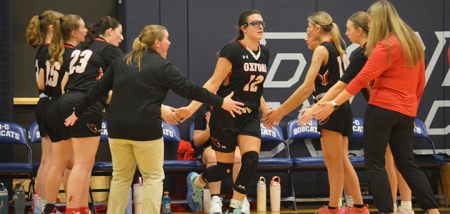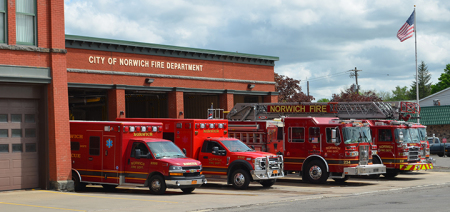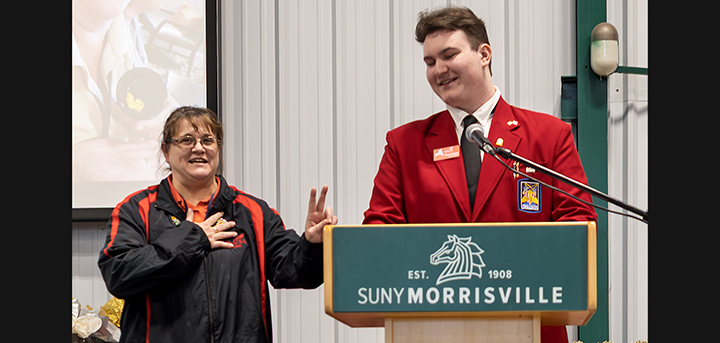Candidates Seek Seats On The Norwich City School Board Of Education
Published:
May 21st, 2024
By:
Tyler Murphy
 1) Karen Sastri, 2) Tameka Leib, 3) Richard O'Hara, 4) Brian Reid
1) Karen Sastri, 2) Tameka Leib, 3) Richard O'Hara, 4) Brian Reid
NORWICH – Voters in the Norwich City School District (NCSD) will be casting ballots for board of education (BOE) candidates and the proposed budget from 11 a.m. to 8 p.m., on Tuesday, May 21, in the District Office Board of Education conference room, located at 89 Midland Drive in Norwich.
The NCSD Board of Education is made up of seven members. There are three seats open on the school board and four candidates. The members are elected to three-year terms. There are also two seats for Guernsey Library Trustee on the Norwich ballot, which is a 5-year term.
According to the New York State School Boards Association, eligible voters must be a United States Citizen, 18 years old or older, and must be a resident of the school district for at least 30 days prior to casting their vote.
The four candidates are seeking a seat on the Norwich BOE are: Karen A. Sastri, Tameka Leib,
Richard O’Hara and Brian Reid.
The four recently shared responses about their candidacies.
Karen A. Sastri
Sastri is a City of Norwich resident and has been in the area for 27 years. She lives with her husband, Shawn and three children, Gehrig, 20, Jackson, 18, and Mikayla, 16.
She has a career in human resources and currently serves as Vice Present and Chief Diversity Officer at NBT Bank. Sastri has a degree in psychology from the University at Albany and certification as a strategic human resources business partner.
“I have been a parent volunteer over the years supporting various school activities like the musicals, music events, sport events etc. I am a parent to three children all of whom attend or attended NCSD. Our oldest son graduated in 2022 and has pursued a career and technical training in the construction field. Our middle son is a graduating senior and will attend college in the fall and our daughter is just completing her sophomore year.” she said.
Why do you want to be on the Norwich BOE?
Sastri said, “I have spent about half of my career focused on talent development and have an overall passion for learning. I have an interest in helping to prepare our youth for life after high school which includes everything from entering the workforce or the military to career and technical training and college. The school vision embraces change and I feel my skills and experience in change management, communication and team culture/engagement could be an asset to the board if elected.”
What are the key issues facing the Norwich School District in the coming year?
Sastri said, “I believe that change is the top issue facing our district. Navigating a post pandemic environment for students and staff, a declining student population, an increasing number of economically disadvantaged students, preparing students for success after high school when college is not always the first or affordable choice are some challenges I believe the school is facing.
“Addressing change requires innovative thinking, sound decision making and a robust change and communication plan. Our school plays a vital role in our community. High performing schools and thriving communities go hand in hand. I believe navigating change effectively will be critical to staff and student engagement, talent acquisition and retention and the long-term success of our school.”
Sastri said her top priorities are, “One, student success: I will work to support initiatives that enhance student achievement, from early childhood through to career and technical education and college readiness programs.
“Two, communication: I will strive to foster open communication and collaboration between parents, educators, administrators, and community members. I believe that a robust strategic communication plan helps all stakeholders to be informed and feel connected to the school and its priorities.
“Three, effective governance and fiscal responsibility: I will uphold a high standard of governance and fiscal responsibility. I will make informed decisions that prioritize safe, equitable and supportive learning environments for our students and staff and ensure responsible accountability of taxpayer dollars.”
What does the school district need to work on?
“I believe the school has an opportunity to enhance communication with a focus on connecting students, staff, families and our community,” said Sastri.
What does the school district excel at?
“I believe our school has many dedicated educators that truly care about the overall well being and academic achievement of our youth.”
What feedback have you received from voters?
“The most frequent comments or questions I get from parents is around communication. Operating a large school district and managing a strategic communication plan that connects multiple stakeholders is no easy task. I first listen to understand the concerns. I often can share my own experience and what steps I may have taken. My response is to encourage parents to raise their concerns directly to the school. Talking about an issue and taking action towards resolving an issue are not one and the same. The school cannot change something if they don’t get the feedback necessary to understand and respond to the issue.”
Tameka Leib
Leib is a lifelong resident of Norwich and has two children attending Perry Brown. Her two younger children will also join the school system in the years to come. She has served as vice president of the Purple Tornado Parent Teacher Student Association for the last two years. Leib is a stay at home with a background working in the direct support profession. She has participated in site based committees at Perry Brown and Gibson along with most recently taking part in the dignity committee, and One Community, One Book program to promote literacy.
Why do you want to be on the Norwich BOE?
“I am running for the board of education because I care about our community I want to see success and growth, I’m motivated purely by a desire to give back to a community that has given so much to me. I grew up in an economically disadvantaged and abusive home in and out of foster care. I have come full circle from that trauma so I offer a different insight that could be invaluable,” she said.
“Diversity in our schools, starts with diversity on the board. I represent just that, as a stay at home mom in the middle class, coming from an economically disadvantaged abusive home,” she said.
“Looking at my resume I may not seem as successful or qualified as the other candidates, or current board members, but you can not put a measure of success on first hand experience, just as I would never downgrade the value of education,” said Leib.
Leib said her top priority would be the students.
“I have this first hand knowledge and insight into the challenges that are faced by students in similar circumstances I grew up in, along with the challenges I face as a parent and community member, with the ever changing school environment has increased my passion to advocate for the needs of students.
“Also being a stay at home mom, coming from this background, and being a taxpayer, having a sustainable budget, is super important to not put more stress on our already stressed economy, I can advocate to ensure that resources and support are allocated equitably,” she said.
“I feel a board member who has succeeded despite facing economic disadvantage and abuse, can serve as a powerful role model for students. I hope my story can inspire and motivate students to persevere and overcome their own challenges. Along with empowering parents to step out of their comfort zone and have their voices heard as well.
What are the key issues facing the Norwich School District in the coming year?
“Successful implementation of Yondr. Enrollment numbers have decreased. Increase in children in displaced homes. Staff retention and shortage,” said Leib.
She said the district should improve site based meetings, polling, and the partnership with the PTSA. She also wants more committees to encourage dialogue before the school implements directives.
“Communication and effective collaboration has also directly affected our staff retention. Thirty-plus teachers have written anonymous letters to the board expressing concern in curriculum, data collection processes and over all job dissatisfaction,” she said, noting the board meeting minutes.
“I’ve personally spoken to multiple qualified teachers and social workers that outwardly said they wouldn’t work for our district or have chosen to leave district. This is concerning when there is already a shortage of these professionals which directly impacts our students and community,” she said.
What does the school district need to work on?
Leib said many cited an “overall lack of clear, consistent communication is creating a barrier in community connection. The district’s attempts to empower the community seem to be a reactive approach, rather than proactive. I understand the district is sent directives from the state, and there can’t always be discussion, but there is a way they could share this information to be more transparent. The district has made committees for parents, students and staff to come and have say in aspects of school atmosphere.”
She added, “Change is hard, especially when it’s so much in a short period, most people can come to some form of agreement if given information, and a chance to process and understand the decisions.”
What does the school district excel at?
“Our district is making a good effort to be responsive to the changes in the employment landscape and economy, but having our district recognize the market and actually respond to it in a meaningful way is really good.
“We are expanding programs, middle school and high school are expanding their offerings. Drone certification, early childhood education, agriculture, FFA, CARE program. We have retained a majority of students in district k-6, because we've created programs to fit the needs of our students,” said Leib.
What feedback have you received from voters?
She said the school was spending $45,000 on a program to ban phones and buying containers and other equipment to hold students’ cell phones during the school day, called Yondr.
“I understand the need, phones are definitely an issue. I am unsure of the action steps for accountability of upholding the no phone policy, that led to its decision. As a taxpayer, I know the upfront cost is pretty hefty over $45,000 and I am unsure of the long term cost for maintaining the program. Perhaps this is something they (the BOE) are going over in the informational meeting they are hosting, but I have not had a chance to really fully look into it, and on the other hand if it’s truly going to create a more academically focused environment and be successful. $45,000 plus is absolutely worth the investment for our children.”
She said questions and conversations are a good thing.
Richard O’Hara
Richard O’Hara is lifelong member of the community with two children in the school district, in grades 4 and 6.
He is involved with many community activities including volunteering for sports teams and clubs, YMCA activities, food drives, support of local food banks, and is the leader of the local United Way at work.
O'Hara graduated from Ithaca College with a bachelor’s degree in economics, a master’s degree in business administration with a concentration in finance at the University of Albany. He has 30-plus years of experience in various fields of finance including budgeting.
“I do a lot of budget work in my current position, and I think that experience that I have with budgeting and finance would work well with the board - particularly given the members who are exiting the position. Mr. Burton and Mr. Birch both have pretty strong financial backgrounds, and I think I would fit nicely in that role that they play as well. I’ve become pretty comfortable with budget processes and fiscal responsibility. That has pretty much been my job for many, many years, so I am very comfortable in that field,” he said.
Why do you want to be on the Norwich BOE?
“There’s two main reasons why I want to be on the board of education. Number one, I’m passionate about the development of young people. I’ve learned over the years of working with kids, particularly in sports, that seeing them grow and socialize has been really enlightening for me. And of course, I have two kids in the district so I am very involved in their development, academically and socially, so I want to continue that with the rest of the young people. And the second reason is that I think that I would fit in very well with the board, particularly with the members who are exiting this year, I think I would fill in the role there nicely,” said O’Hara.
What are the key issues facing the Norwich School District in the coming year?
“One, fiscal responsibility – ensuring that our tax and aid dollars are spent wisely and focused on the vision established for our young people We must ensure that we are working and spending within the guidelines established by the budget toward programs, curriculums, hiring practices, etc., that also effectively work toward success of our vision.
“Two, collaboration – must ensure that all groups with a vested interest in the success of our vision are aware of that vision, and are working toward fulfillment of that vision. We need to ensure that these various groups are “on the same page” and working together: Community, faculty, parents, students, and board. We need to build bridges among these groups which will involve more effective communication and trust building through demonstration of success.
“Three, communication – I have experienced communication breakdowns first hand, whether it be parent-faculty, community-district, and others. Communication plays a vital role in effective collaboration. Building bridges among these groups will require a lot of work with communication methods.
“Four, attendance – poor attendance is a problem for our district. We need to work toward innovative ideas to improve attendance including incentives, recognition.
“Five, Socialization skills of our students – The pandemic, coupled with the rapid rise in social media usage and platforms has eroded the socialization skills of our young people. I think reducing the amount of time that students can be active with social platforms during school can improve socialization of our students while at school. I would also advocate for additional social club opportunities for our students if elected,” said O’Hara.
What does the school district need to work on?
“The community representation at the board meetings that I have attended has been shockingly small. There was only a handful of community members at the last board meeting that I went to, and that was a little disappointing and discouraging, given the fact that the community should be heavily involved in the district and the business of the district, there would be a stronger representation of the community at the board meetings. But after talking with some of the board members, I found that it is pretty commonplace, in particular in our district, that there’s not a lot of representation from the community, and I think that has a lot to do with communication. If we could build a stronger bridge between the community and the district, build the trust, see some results — and I think that would go a long way,” said O’Hara.
“Attendance has become a major concern. Obviously, if the students are not attending classes or not attending school, there’s not a good opportunity for them to learn and develop. There are a lot of articles out there talking about this issue. In the latest installment of a publication from New York State, the headline on the front page read, “One-third of school students are chronically absent”. That’s a huge problem. There has to be ways that we can incentive and reward attendance. I don’t know specifics of how that would work, but I think that is something that we should work on,” he said.
What does the school district excel at?
“The district has some really talented individuals on staff, and I’m talking primarily about the facility. For my sixth-grader and fourth-grader, I’ve had tremendous success in working with the teachers on their education and their development. All of the teachers that I’ve come across so far have been absolutely wonderful. That being said, I think there is a real issue in attracting more qualified and talented teachers to the district, and I think that’s common for a lot of areas, not only within our district, but for companies in the community too. How do we attract and retain good people.
What feedback have you received from voters?
“With the pandemic coupled with social media, and that everyone has a smartphone now, I think it has taken over and has really eroded the socialization skills of young people. I see that firsthand with my sixth-grader. He has a smartphone, and I can see very clearly that he doesn’t socialize as much as he would otherwise. I think that’s a problem, I think socialization is an important skill and equally important to academics with respect to preparation of our young kids for life after school,” he said
“The most frequently asked question that I receive is 'What are you going to do to improve the district if elected?' I typically respond with the some of the issues facing the district as I see them, and how I would advocate for addressing the issues. Examples would be budget challenges, both this year and future years, building trust with the community, communication breakdowns, social media in school, poor attendance, socialization skills of our young people, etc.,” he said.
Brian Reid:
Reid is the current BOE president and has served in multiple roles on the board for two three-year terms. He has a degree in engineering and management with a master’s in global operations management from Clarkston University. He and his wife grew up in Messina, New York, and have lived in Norwich for 12 years.
They have four children, Nolan, Braden, Collin and Kerragan. Nolan is currently in first grade in the district and his three other children have already gone through the grade levels.
Reid moved to Norwich and became the plant manager at Norwich Pharmaceuticals, formerly Alvogen, for a number of years. He also worked in Utica for an electronic materials manufacturer, the Indium Corporation, as vice president of global operations.
He has also served on the board for Commerce Chenango, United Way and Heart Association Board. Reid helps coach JV and varsity soccer, is involved with the sports booster club.
Why do you want to be on the Norwich BOE?
“I feel I bring experience and I have a unique background. I interview and hire lots of kids right out of high school, lots of folks just out of college, I think I have the ability to understand the skill and talent employers are looking for and I think I can continue to help the school in making sure we develop programs that set kids up for their future endeavors. Additionally I have a pretty strong finance background, as well as a background in talent management and people development. So combining those two skills will continue to help the board,” said Reid.
“So, two years ago when I joined the board we were one of the most fiscally stressed school districts in the state and there were a number of reasons that go into that, and that was one of the major reasons why I joined.
“I have an extensive experience in understanding finances and I have dug pretty deep and uncovered the layers of the onion so to speak, with the school finances - what is causing challenges, where are the issues, and I was able to appropriately challenge the business manager and make some necessary changes to put us in a position where now we are in the middle of a 30-plus million dollar capital project. We have a really strong fund balance and we are nowhere near the radar of the state's list of fiscally stressed schools. We are in a very solid place with a solid standing and on good fiscal footing,” said Reid.
What are the key issues facing the Norwich School District in the coming year?
“The number one challenge right now for many school districts and certainly ours, is recruitment and retention. New York State specifically, and most states, there is a declining population into university to get degrees in education. So there are a lot less people who are qualified to take the job of teacher or administrator and on top of that, New York faces additional challenges, with schools like SUNY Potsdam, which is facing a significant decline in enrollment, a school that traditionally has been a theater for education. At the same time, Chenango is a relatively small county in terms of population. In areas where population is low like Chenango County, we face an even harder challenge than the more urban areas. We face significant challenges from places like Broome County, as an example, where some of the newer teachers may be prone to move towards. So being able to recruit those teachers is incredibly difficult, and then finding them the means and methods to be fulfilled in their career,” said Reid.
“We have to know what is important for staff and teachers and listen to them and do our best to find creative ways to offer opportunities so they can feel fulfilled in all aspects of life, and cater to the whole employee. We need better retention,” he said adding, “Ultimately it comes down to talking, listening and acting on the feedback we received.”
What does the school district need to work on?
Reid said, “We need to do a much better job of having an approved connection with the community. It wasn’t that many years ago I think the community and school probably felt more aligned, and that's a bit more challenging than it has been in the past, maybe due to COVID, which gets blame for lots of things. Maybe it is social media, people just aren't as physically present anymore, blame it on what you want. The reality is there isn't as deep of a connection.”
“We owe it to the community to build and foster those connections and improve communication,” he said.
“I would like to see a community action committee created on the board. It's something we tried to do years ago but COVID hit and that became tough to have. I would like to have groups meet on regular interval that are cross-functional, you have staff, administrators, you have some students, some community members, etc., and they get together to discuss important challenges and issues. It will help educate the community and helps provide diversity of opinion. But it also helps students as well understand their part they play in the community and it's a kind of participatory part of government.”
What does the school district excel at?
“Our employees, because they do have those deep connections,” said Reid.
“We can offer a deep personal connection that doesn't sometimes exits in larger schools or more urban areas,” he said. “You show up at a concert of a play or a sporting event, seeing the people they teach and having that kind of connection to the community is something that appeals to a lot of people.” he said. “When you see an employee that has a relationship with students second to none.”
What feedback have you received from voters?
“I think the most common question I am asked is something around budget and capital versus expense,” said Reid.
“School finance and business finance is not the same, there are a lot of restrictions on the way money is spent and budgeted, and collected at a state level.
“What happens is someone will say, 'Hey I see you just put in a brand new turnaround at Perry Brown or a new turf field at the high school. How do we do that if we need to spend more money to recruit teachers. What most people might not understand is the capital budget process and how capital is allocated is not the same as how expense is allocated,” he said.
“We spend a certain amount and get refunded by the state, depending on the project and that capital can't be spent on expenses,” said Reid.
He said the capital was primarily for building projects and people often comment, “'Instead of building a new roof, why not just hire a couple of physics teachers instead.' Understanding school finance is how to allocate funds from something like a building project to expenses is not something most people understand, even some finance people.”
Author: Tyler Murphy - More From This Author
Comments








